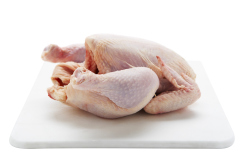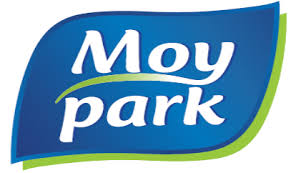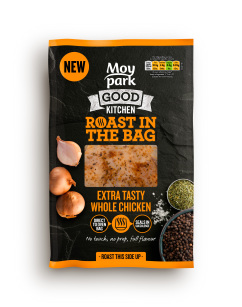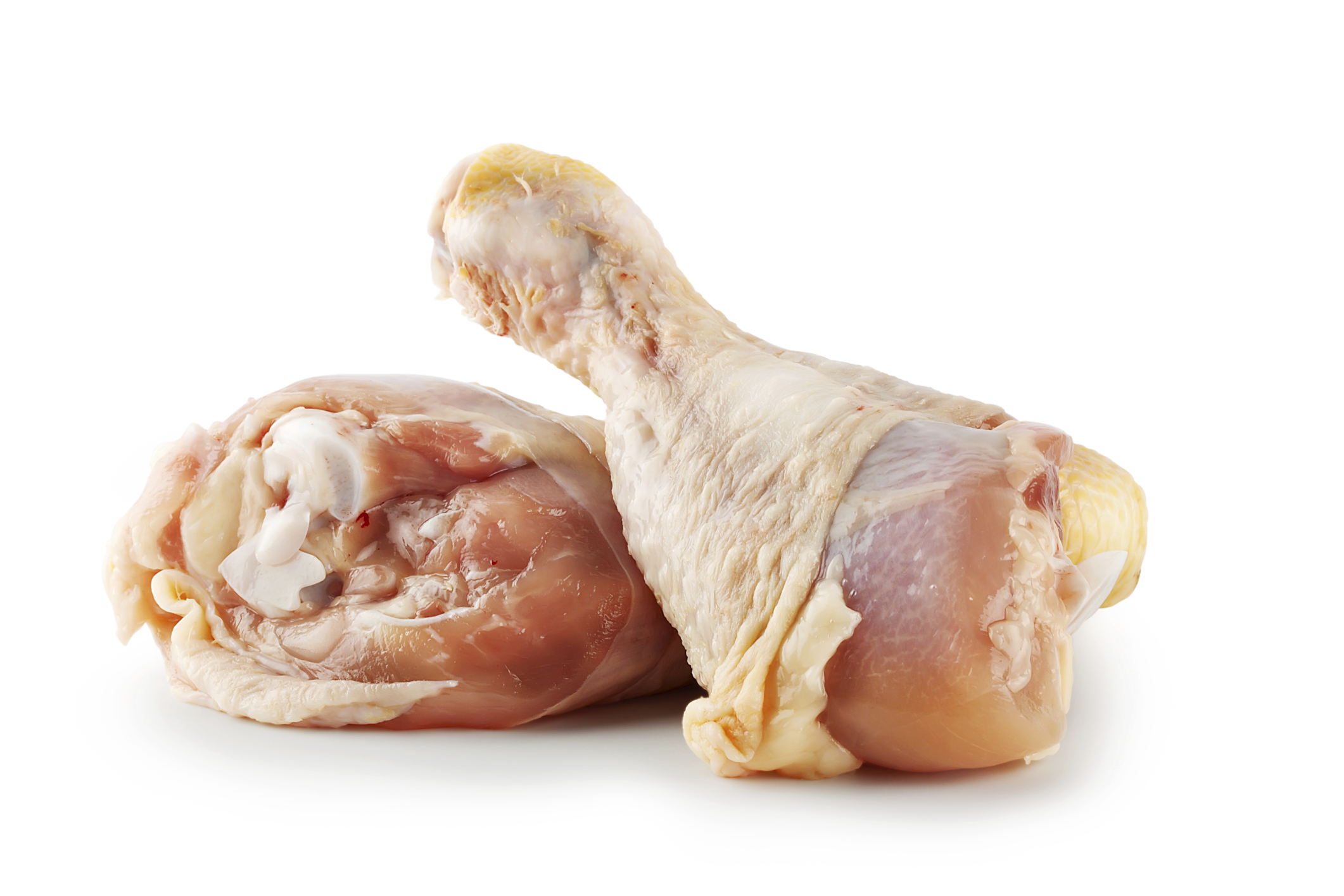Chicken News
The FSA’s year-long survey, which tested around 4,000 samples of whole chickens bought from UK retail outlets and smaller independent stores and butchers over the past 12 months, found the presence of campylobacter in 73% of chickens tested. One-fifth (19%) of chickens tested positive for campylobacter with the highest band of contamination (more than 1,000 colony forming units per gram (>1,000 cfu/g)).
Just 0.1% (five samples) of packaging tested positive at the highest band of contamination with 7% of packaging testing positive for the presence of campylobacter.
All of the major retailers failed to reach industry targets to reduce the bug over the period of the study. Tesco was found to have the lowest numbers of campylobacter, with just 12.8% of its chickens found to have the highest band of contamination while 66.5% of its chickens had presence of campylobacter.

Marks & Spencer, Morrisons, Sainsbury’s and Tesco all had below-average levels of campylobacter found, while 80% of Asda chickens tested positive for its presence. Just under one-third (29.7%) of Asda chickens tested positive for the highest band of contamination.
Steve Wearne, FSA director of policy, praised the retailers that had reduced incidents of campylobacter but called for more action: “I am absolutely delighted to see the really encouraging results from these four supermarkets and their suppliers. They are making a real difference to public health, helping to cut down on the estimated 280,000 people who get ill from campylobacter each year.
“As we have always said, if you are prepared to work across the food chain to reduce the spread of this bug then you will get results.
“I want to challenge those retailers who haven’t yet demonstrated the effect that M&S, Morrisons, The Co-op and Waitrose are having on reducing campylobacter on chickens on their shelves. We expect all retailers and processors to be achieving the reductions we have seen in these retailers’ figures – that’s the only way we will meet the target we all signed up to.
“We are going to run this survey for a second year and will again look at campylobacter levels on chickens at retail sale. I hope that we will be able to see the results from the actions taken by the four retailers mentioned above and others come through and produce much lower figures for the incidence of campylobacter on the chicken we buy.”
Richard MacDonald, chair of the ACT (Acting on Campylobacter Together) board, added: “I have been impressed by the level of commitment and tangible action being taken by a number of retailers and processors of chicken. I hope we continue to see further progress in our fight to significantly reduce or even eradicate campylobacter on chickens. Individual actions and cross-industry sharing of best practice are starting to have a real and tangible impact.”
Commenting on the results, a British Poultry Council spokesperson said: “As highlighted by the FSA, individual producers and their retail customers are working bilaterally to trial options including enhanced biosecurity, management of thinning, improved processing, temperature treatments, and novel packaging. It is worth reiterating that campylobacter is killed by thorough cooking, and cross-contamination can easily be avoided by good kitchen hygiene practices.
“The BPC is committed to ensuring that when practical and effective solutions for beating campylobacter are developed, they will be made available to all producers.”
A new survey will start this summer and once again sample fresh whole chickens from all types of shops
Chicken processor Moy Park has been presented an International Safety Award with merit for promoting high standards of health and safety management in the workplace.

This is the second year Northern Ireland’s Moy Park has picked up the accolade, which was this year delivered to its Convenience Business Unit
Mike Mullan, Moy Park’s HR Director of Europe, commented: “We are delighted to have received this great accolade once again. It is fantastic for Moy Park to sit among leading businesses from across the UK and the rest of the world. At Moy Park we are committed to continually driving forward health and safety practices for our employees and to maintaining the very highest standards. We are honoured that these high standards have been acknowledged with this prestigious award.”
The awards, run by the British Safety Council, are in their 57th year.
Neal Stone, acting chief executive of the British Safety Council, congratulated Moy Park on its success. Stone said: “Awards have an important role to play in shining a light on those employers who are taking sensible and effective steps to ensure the health, safety and welfare of their workers, celebrating their efforts and encouraging other businesses everywhere.
“The International Safety Awards rightly reflect the importance of aiming for good standards of health and safety at work. Moy Park’s Convenience Business Unit should rightly be proud of its achievement.”
Moy Park is following the roast-in-the-bag trend with two new flavours of whole chicken roasts.
The ‘Good Kitchen’ range includes ‘Extra Tasty’ and ‘Garlic & Herb’ ready-to-roast chicken.

Moy Park said the range was created to target a growing market for added-value fresh chicken products.
Briege Finnegan, brand marketing manager for Moy Park, said “Our new roast-in-the-bag range is the first retail-ready, ovenable whole chicken product to use this innovative packaging technology.”
However, retailers, including The Co-operative and Marks & Spencer, are opting for roast-in-a-bag packaging for chicken products to reduce instances of campylobacter as a results of the Food Standards Agency’s clampdown on the bug.
“The packaging self-vents and enables the chicken to self-baste throughout the cooking process, which results in more succulent meat and an enhanced flavour. We developed the range to offer consumers a convenient shelf-to-oven roast-in-the-bag chicken, making it ideal for those who don’t like touching raw meat or don’t have time to prepare a raw chicken from scratch. Due to the innovative nature of the packaging, the chicken browns in the pack without having to open it during cooking. The cooking juices are retained within the pack, which means consumers will be able to create flavoursome stocks and gravy,” Finnegan added.
The Moy Park ‘Good Kitchen’ Roast in the Bag range will be available in retailers across GB from May 2015. RRP is £5.
2 Sisters has posted flat sales in its chicken processing business in “the toughest commercial environment” in many years, according to CEO Ranjit Singh.

The company reported like-for-like (LFL) sales of £818.3m, an increase of 1.3%, for its second quarter. However, its protein arm suffered a decline of 2.8% in sales.
Singh said the avian influenza outbreak last year cost the company £6.2m in lost carcases and reduced sales.
Meanwhile, the Food Standards Agency’s campylobacter figures were creating “a negative sentiment”, which Singh said the company was dealing with.
He said in statement: “In our protein business, I take great pride in our continued industry-leading investment in the fight against campylobacter, but the market remains very tough.
“However, we continue to integrate the division, following the Vion acquisition, and we are taking action to deliver efficiency and output improvements across our sites.
2 Sisters’ chilled division looked more positive. Singh added: “A year ago, our chilled division’s profitability was impacted by the aftermath of horsegate. I am pleased to report that, a year on, we are making steady progress, with like-for-like sales up 2.9% and another quarter-on-quarter improvement in operating profit.

“Our branded products continue to operate in aggressive markets and continue to see pressures on sales mix and promotions. Branded achieved a modest operating profit in the quarter and like for like sales were similar to the same period last year. We continue to invest in quality and marketing at Fox’s biscuits.
“This is the toughest commercial environment I can recall for many years, with substantial changes at many of our larger customers. We expect conditions to remain difficult, but are firmly focused on delivering quality.”
A former government advisor and leading food expert has called for a boycott on supermarket chicken following yesterday’s campylobacter results.
Writing on The Guardian website, Professor Tim Lang called for the British public to boycott supermarket chicken products: “Dear British public, be outraged, act, withhold your money until you can have confidence in what you consume. This may not be orthodox public health strategy but it is definitely what history shows works when standards are as dire as these results show them to be,” he stated.

Lang was a former expert advisor to the health and environment department until 2011 and was instrumental in the set up of the Food Standards Agency (FSA). His comments follow yesterday’s revelation by the FSA that 70% of supermarket chickens tested positive for the bug.
Lang said the FSA results were as bad as the salmonella scandal and BSE in cattle: “What these results show is that they have slipped backwards again: the rate of campylobacter is even higher than the rate of salmonella in poultry was in the 1980s; this is dreadful. Salmonella has come down and our problem now is campylobacter; but one form of bad news fading only to be replaced by new bad news is hardly progress,” Lang stated.
However, the British Poultry Council refutted Lang’s comments in a statement: “There is absolutely no reason for anyone to stop buying British poultry. All poultry is safe to eat. Millions of consumers enjoy poultry every day as they recognize it is a safe, affordable and environmentally sustainable quality meat.
“Consumers are able to make an informed choice, and they have consistently made poultry their favourite meat – in the UK almost as much poultry is consumed as beef, pork and lamb combined.
“The industry is working hard to tackle the bacterium before it reaches consumers, but consumers also have an important role to play as proper cooking kills campylobacter.”
Asda came out worse of all the retailers with 78% of its raw chicken products testing positive for campylobacter. Asda said it was disappointed at the results and stressed it was “working hard” to find a solution.

A young Devon farmer is preparing to embark on a 39-day tour of Europe to campaign for clearer poultry labelling – and is doing it dressed as a chicken.
Tamsin French will be costumed as a chicken called ‘Rosa’ and will travel through 21 EU member states in 39 days, which is apparently the average lifespan of an intensively farmed meat chicken. Rosa the chicken is calling for clear and mandatory labelling so that consumers can see how their chicken has been kept. The 39Days4Rosa tour is taking place as the European Commission reviews poultry meat labelling this summer.
French’s family farms a 22,000 strong, Freedom Food-assured broiler flock in Devon. She said: “Our free-range chickens live for 56 days, and from the moment they’re old enough to go outside, they can range through tree-covered, landscaped fields where they can express natural habitual behaviour. It’s important that consumers can accurately and easily identify the farm system used to rear their chicken meat. The labelling term ‘free range’ accurately reflects the life of our free-range chickens.”
She will be joined on the trip by Johanna Olsson, an Animal Science student from Berkshire, and Sam White, an animal welfare campaigner from Essex.